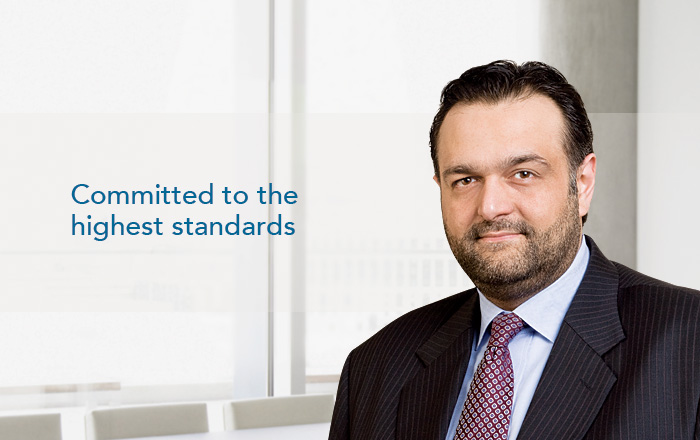Annual Report 2010
Chief Legal Counsel's Message
Mubadala continues to be committed to the highest standards of corporate governance and compliance across the Group, and we made great strides towards achieving this during 2010.

Corporate Governance
The Board of Directors is responsible for the direction and oversight of Mubadala on behalf of our shareholder and is accountable to our shareholder for all aspects of our business. The Board believes that effective governance is primarily achieved through delegating some of its authority for executive management to the Investment Committee and to the Chief Executive Officer and Managing Director, subject to monitoring by the Board and the limitations defined in the Mubadala Delegation of Authority.
The Board’s governance mandate deals with its relationships with our shareholder and executive management, the conduct of the Board’s affairs, and the tasks and requirements of Board committees. The Board also monitors Mubadala’s focus and commitment to activities that promote our shareholder’s interests including, in particular, the active consideration of strategy, risk management, and financial planning and performance.
The CEO describes to the Board in the Annual Business Plan and Budget how Mubadala’s strategy is to be delivered, together with an assessment of risk and compliance issues. During the year, the Board monitors the progress made in achieving the goals set out in the Annual Business Plan. The CEO is obliged to review and discuss with the Board all strategic projects and developments, and all material matters currently or prospectively affecting Mubadala and its performance, in accordance with the Delegation of Authority.
Although ultimate responsibility for adopting standards of corporate governance rests with the Board of Directors, the Chief Legal Counsel is responsible for overseeing corporate governance as well as related policies and procedures. In addition, each employee appointed to serve as a Board or Committee member for the Mubadala Group is aware of their important individual duties and responsibilities in shaping our success and development. To aid such individuals, we have developed a Corporate Governance Handbook for directors and committee members, which sets out their key roles, responsibilities, and fiduciary duties. Furthermore, the Chief Legal Counsel oversees the corporate governance training program, whereby regular focused training workshops are provided to relevant individuals.
The performance of boards and committees across the Group is monitored closely and each board and committee is mandated to conduct an annual evaluation process.
Board of Directors
The Board of Directors is responsible for the direction and oversight of Mubadala on behalf of its shareholder and is accountable to it for all aspects of Mubadala’s business, including corporate governance, focusing on activities that enable it to promote its shareholder’s interests and ensure Mubadala is fulfilling its mandate. The Board believes that good corporate governance is underpinned by clear roles, responsibilities, and accountabilities, together with the proper utilization of distinct skills and processes.
Certain aspects of the Board’s authority are delegated to the CEO, Khaldoon Khalifa Al Mubarak, and members of the Investment Committee. This delegation is subject to ongoing review as well as the limitations set out in Mubadala’s Delegation of Authority.
The Board convened six times in 2010, in addition to a large number of informal meetings, discussions, and written resolutions.
Audit, Risk and Compliance Committee
The Audit, Risk and Compliance Committee comprises three non-executive Board members. The members are Hamad Al Hurr Al Suwaidi as the Chairman, Nasser Ahmed Khalifa Alsowaidi, and Mohamed Saif Al Mazrouei. The Audit, Risk and Compliance Committee is mandated by the Board to oversee the financial, risk management and compliance activities of Mubadala, which include the review and monitoring of:
- Recommendation of appointment of external auditors
- Oversight of external audit process
- Integrity of financial statements
- Internal control systems
- Internal risk management systems
- Independence of external auditors and the provision of non-audit services
- Effectiveness of Mubadala’s corporate governance and compliance programs
The Committee meets as frequently as required, but at least four times annually, following receipt by Mubadala of the half-year accounts and the final annual audited accounts.
Investment Committee
The Investment Committee is mandated to review, consider, and approve certain corporate, strategic, organizational, operational, performance, investment, and financial matters across Mubadala. It is responsible to the Board for developing and monitoring Mubadala’s financial and non-financial strategy.
The Investment Committee, which typically meets around three times a month, comprises the CEO, the COO, the CFO, and the CLC.
Among other responsibilities and duties, the Investment Committee reviews and assesses the annual plans and budgets submitted by each business unit, subsidiary, and jointly controlled entity; monitors, evaluates, and makes recommendations to the Board with respect to existing and potential investments and projects; and approves investments of each of the business units, subsidiaries, and jointly controlled entities in accordance with the financial thresholds set out in the Delegation of Authority. In the case of investments above such amounts, the Investment Committee endorses the investment for approval by the Board.
Compliance
Mubadala is committed to developing an effective Group-wide compliance program based on global best practices. This program consists of the following elements that operate continuously and are focused on protecting the Group by preventing, detecting, and responding to compliance issues:
- Risk assessment – review and identify risks, ensure abatement plans and policies are in place, and prevent and detect unlawful and/or unethical conduct
- Reporting – provide channels to report concerns (including anonymously) and manage compliance investigations
- Training – create training programs and ensure employees are knowledgeable, aware, and committed to acting ethically and compliantly
- Communicating – provide creative and comprehensive programs to build awareness and knowledge
- Evaluating – assess compliance program effectiveness and efficiency, and prepare compliance performance and assessment reports for senior management and the Board
- Relating – build regulator and partner relationships, and identify emerging risks and issues
The Board is responsible for ensuring that there is an effective compliance program in place. It fulfills its oversight duty through the Audit, Risk and Compliance Committee, the CEO, and senior management. The Audit, Risk and Compliance Committee and CEO delegate the review and implementation of the compliance program to the Compliance Review Board, which consists of the COO, CFO and CLC, as well as other members of senior management appointed by them. The Compliance Review Board is assisted by the Compliance Office, which has been established within the Legal & Compliance unit. The compliance program is implemented through a Corporate Compliance Council, which is composed of compliance representatives from each business and corporate unit across the Group.
As part of the compliance program, Mubadala has implemented a comprehensive Code of Conduct applicable to directors and employees of Mubadala and its subsidiaries. Such persons are required to complete training as required and acknowledge their commitment to the Code annually. The Code is also applicable to third parties such as contractors, consultants, and partners who work with or represent the Mubadala Group.
Samer Halawa
Chief Legal Counsel
